Jen Silverman’s absurdist dark comedy "Bonnets (how ladies of good breeding are induced to murder)" is a feisty feminist fable
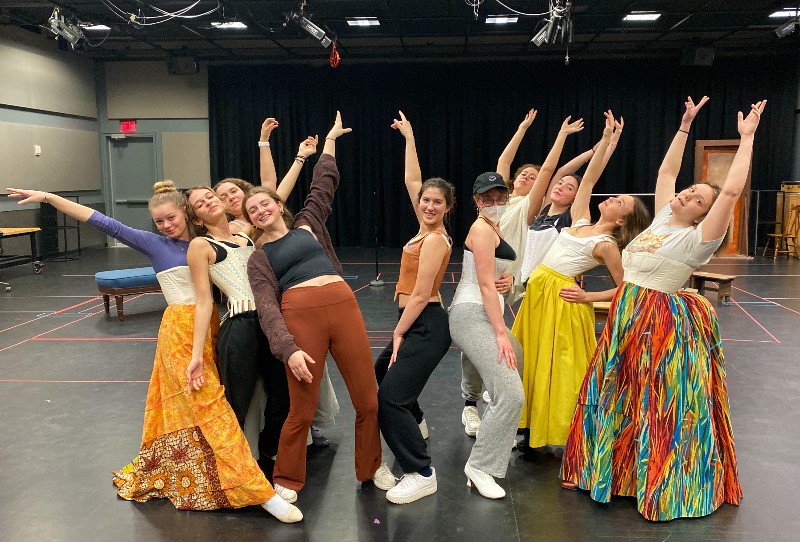
Jen Silverman’s Bonnets (how ladies of good breeding are induced to murder) is so violent that it took a fight director and two assistants to choreograph it. Death by poison arrow, chainsaw, Ninja—it’s all there for your delight and horror. Even God, a character in the play who opens every scene, is powerless to stop it.
The chorus of one song in Bonnets goes like this:
Chop, chop, chop, chop, chop, chop
We killed a man a-piece and we just couldn't stop!
Glug, glug, glug, glug, munch, munch,
Join me for tea-time, you might not live to lunch.
Will anyone survive in the dark comedy that runs February 16-19 at Lydia Mendelssohn Theatre?
Pricilla Lindsay, who directs University of Michigan theater students, says the play shifts between three eras. “Silverman picked three of the many times men have subjugated women—Salem in 1690, England in the 1890s, and France in the 1600’s, during the reign of Louis XIV. All three periods are not special but indicative of women being moved to the side. In our play, women wreak havoc and get revenge by actually murdering.”
These women don’t stop at killing their abusers.
“A young girl who is having an affair with a married man accuses his wife of being a witch,” Lindsay says. After his wife hangs, the man decides to leave for Boston—without his young paramour. ”You’re dead to me,” she declares.
In this play, that can only mean one thing.
Searching for the Right Words: Julia Cho's award-winning "The Language Archive" makes its Michigan debut at Theatre Nova
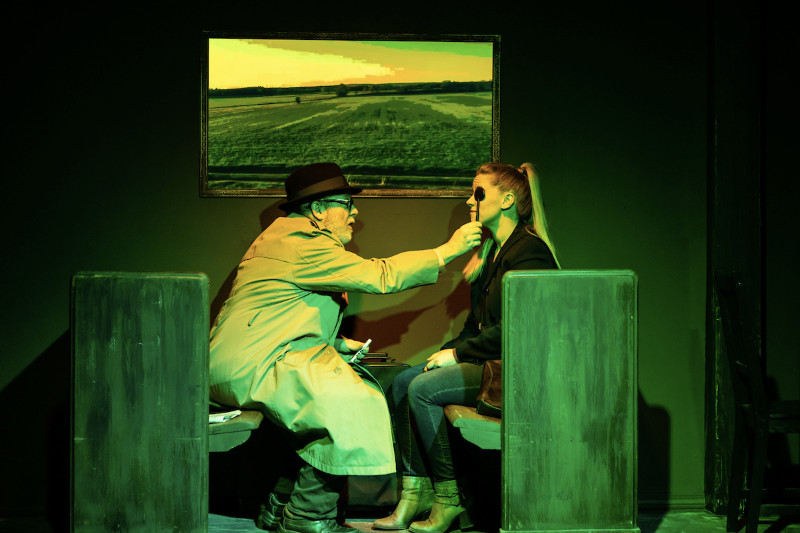
When Julia Cho read about dying languages, she wondered if losing a language meant something larger—losing a whole way of looking at the world.
In her whimsical play The Language Archive, Cho explores the questions: Do languages that develop between people in a country (or a marriage) die when the participants die? Does the culture die when the language does?
First produced in 2009 at The South Coast Repertory Theater in Costa Mesa, California, and then in 2010 at the Roundabout Theatre Company in New York City, The Language Archive makes its Michigan debut at Ann Arbor's Theatre Nova, February 3-26, directed by Carla Milarch. (The play won the 2010 Susan Smith Blackburn Prize, awarded to a new English-language play by a woman.)
“There are sixty-nine hundred languages in the world. More than half are expected to die within the next century,” says George, a linguist and the play’s protagonist. In addition to his native English, George speaks eight languages including Greek, Cantonese, Esperanto, and Elloway—the last of which is a dying fictional tongue.
U-M Gilbert and Sullivan Society celebrates its 75th anniversary with pirates, policemen, and paleontologists

With cat-like tread, a rollicking band of pirates will step upon the stage from December 8-11 as they have done about every four years since 1949 when the two-year-old University of Michigan Gilbert and Sullivan Society (UMGASS) gave its first performance of The Pirates of Penzance.
Sparkling tunes and lyrics replete with irony, wit, conflict, and romance make it no surprise that UMGASS would celebrate its 75th anniversary with a production of Gilbert & Sullivan’s two-act comic operetta. Director David Andrews says, “It’s probably the best known and best loved of Gilbert and Sullivan’s pieces.” Andrews says the show doesn’t just have catchy melodies that people hum on the way out: “Some people are humming on the way in,” he says of the well-known show.
U-M's production of the musical tragedy "Bernarda Alba" mixes period costumes and an abstract set to confront contemporary issues facing women

Fredrico Garcia Lorca wrote The House of Bernarda Alba in 1936, shortly before he was murdered by a nationalist firing squad during the Spanish Civil War. Michael John LaChiusa shortened the title to Bernarda Alba when he set the play to music and added lyrics; he made some changes to the play while keeping the essential story:
Bernarda Alba assumes the role of family head after her husband’s funeral. She orders her five unmarried daughters, ages 20-39, to mourn for eight years, as her mother did before her. It will be as though the house is bricked up; even crying is forbidden. One problem is that three of the sisters are enamored with the handsome Pepe el Romano—the eldest is engaged to him—and jealousy takes center stage. But what exactly can the sisters do under the circumstances? Turns out, some life-altering things.
When the musical tragedy opened at Lincoln Center in New York in 2006, the scenic design was drab, a realistic depiction of this closed and lonely home.
For Linda Goodrich's production of LaChiusa's Bernarda Alba adaptation that's running November 10-13 at the University of Michigan, scenic designer Jungah Han dropped the drab for what Goodrich calls a “wildly inventive” set. The stark red floor is bordered by a black playing area, with a kind of ceiling that descends to oppress the characters. Actors step out of character and onto the rim at times to witness the action or to narrate.
"North Country" Fare: The 40th-anniversary edition of Jay Stielstra's folk opera sails into The Ark
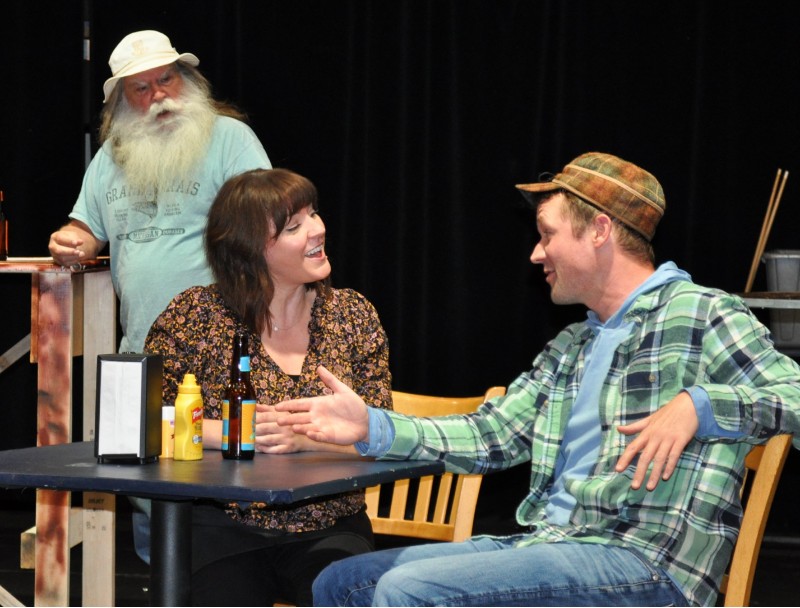
Forty years ago, Jay Stielstra was playing his songs to enthusiastic listeners around Ann Arbor, mostly at Mr. Flood’s Party, a bar that once stood on 120 West Liberty. Bouyed by the response to his tunes, the folk singer decided to write some continuity and put them together in a play, North Country Opera.
“The main thing that carries it are the songs,” Stielstra says. “I asked other musicians I knew in Ann Arbor if they wanted to be in a play, and they all said yes.”
Stielstra knew one of the founders of the Performance Network, the late David Bernstein, and brought the work to him. “David was very enthusiastic,” Stielstra says, and North Country Opera premiered in 1982 as the fledgling theater's second production.
The play was revived in 1992, 1993, and 2003 in Ann Arbor, and in 2022 it toured Northern Michigan, with the 89-year-old playwright along for the ride. North Country Opera returns to Ann Arbor for one night, October 18, at The Ark.
Emilio Rodriguez asks who gets to decide what’s offensive in his play "God Kinda Looks Like Tupac"
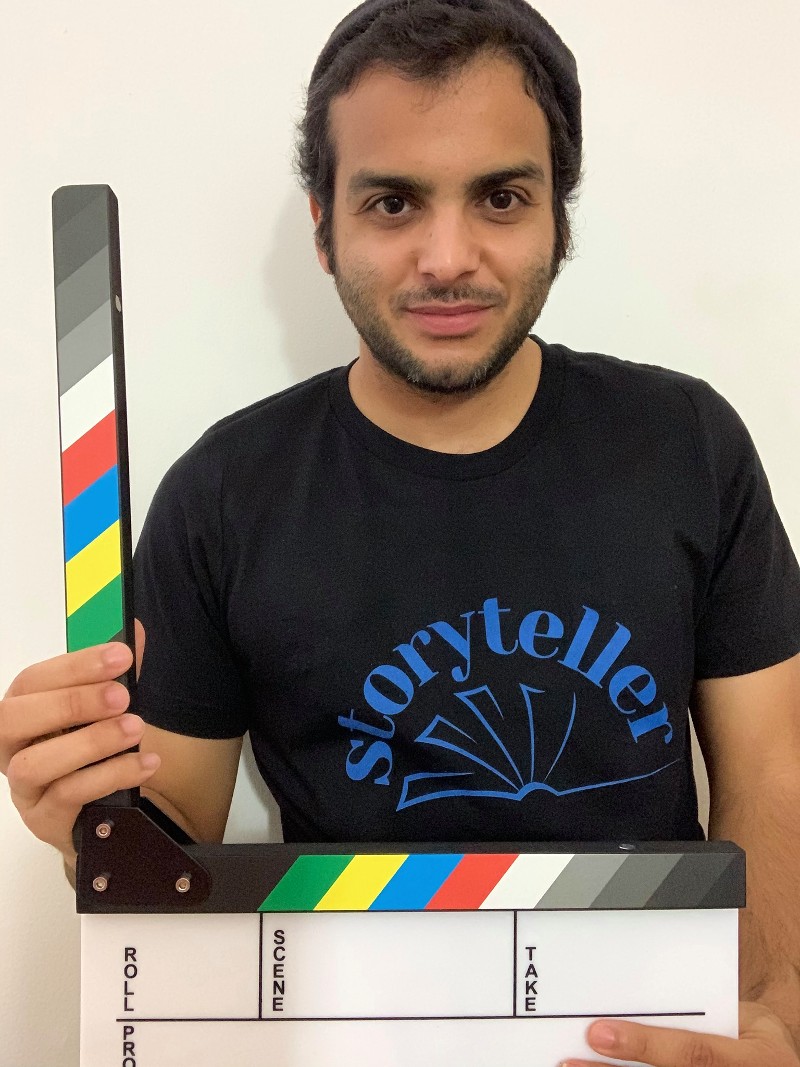
NOTE: "God Kinda Looks Like Tupac" has been pushed back from its original opening date to August 5 due to illness.
Emilio Rodriguez, whose play God Kinda Looks Like Tupac opens at Ann Arbor's Theatre Nova on July 29 August 5, says his theater career started early.
Very early.
Donning his mother’s high heels and appropriating her broom and a funnel, he performed “one-kid adaptations of The Wizard of Oz” in the family’s living room.
Perhaps one reason why a movie with the famous line "There's no place like home" resonated with Rodriguez is that he is a self-described “military brat” who grew up on the move. Rodriguez says he didn’t have a sense of hometown until he moved to Detroit in 2012 to teach high school English and drama for AmeriCorps. One thing that informs all his work, he says, is “a loose sense of the idea of home. The plays are not necessarily set in someone’s home [but ask] … how do people make a sense of home?”
When Rodriguez began teaching, he saw the classroom as “an extension of home. … In the younger grade levels, kids spend more time at school than with their families.” He also found that friendships with colleagues gave him a sense of connection, of a mock family, a home.
Rodriguez set God Kinda Looks Like Tupac in a Detroit high school, where a white art teacher in the mostly Black school has been targeted as insensitive. A Latino teacher offers a suggestion to the art teacher that might help him keep his job: It’s Black History month, she tells him, and there’s a competition; if a student he enters can paint something in celebration of the month and win, chances are good he will be named Teacher of the Year.
And who would fire Teacher of the Year?
Homeless kids find a voice in U-M's production of "somebody's children"
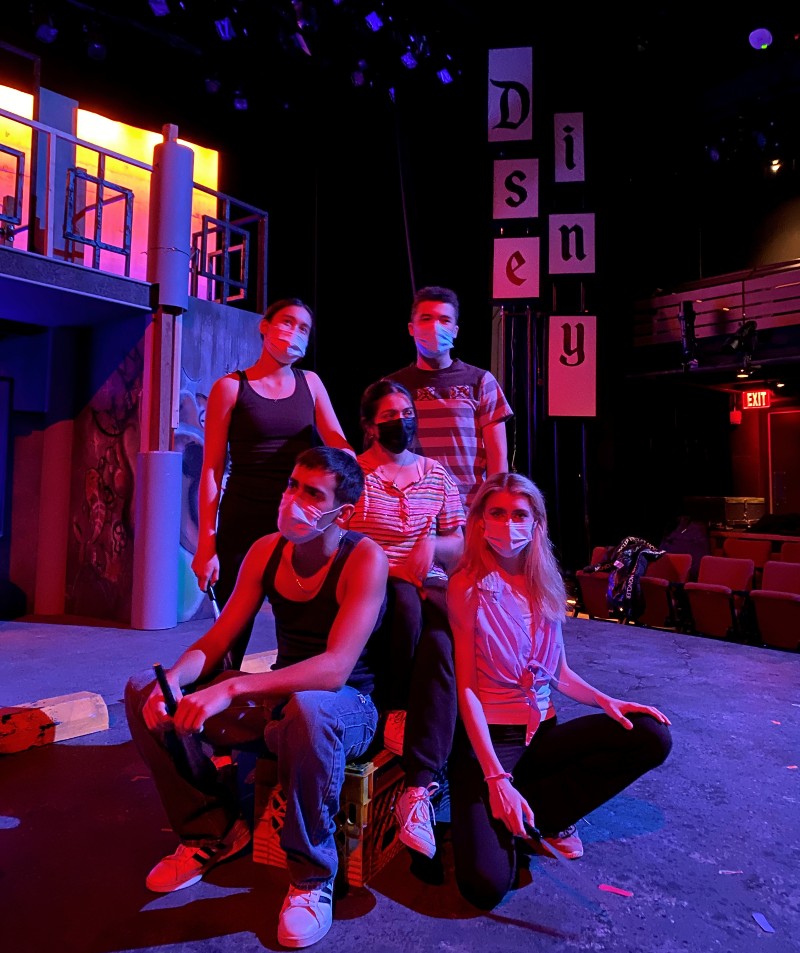
Thirteen years ago, the Found Spaces Theater Company in Los Angeles commissioned a play from José Casas about homelessness. “I was really struggling with the play,” he recalls. “It was like a bad afterschool special with two-dimensional characters.”
Then the artistic director gave Casas an article about homeless kids who lived in motels, kids with fathers who were absent or deceased, who live near Disneyland and suffer “earth-shattering tragedies each day.“ At once, he was inspired by the thought of some children enjoying a theme park, while children in abject poverty were near enough to hear their laughter.
And somebody’s children took shape quickly. The University of Michigan is staging a production at the Arthur Miller Theatre through April 2.
In Transition: Jeffry Chastang's “Under Ceege” explores tension, change, and stasis between a son, a mother, and her community

In June 2021, after the brutal murder of George Floyd and the emergence of the Black Lives Matter movement, many theater artists began to wonder if they had done enough to combat inequality. American Theatre published responses of a sampling of theaters across the country, and the magazine’s editor, Rob Weinert-Kendt, wrote that artists “must not let this moment of potential for change … pass us by.”
The Purple Rose Theatre Company felt the call of the times, too. While founder Jeff Daniels was on Broadway as Atticus Finch, a white lawyer who defended victims of prejudice in To Kill a Mockingbird, he wrote to the theater’s supporters expressing pride in the Rose’s diversity record: 30% of productions featured a person of color, Daniels reported. Seven productions centered on a diverse community, and four were written by playwrights of color. “But it’s not enough,” Daniels added.
So, the artistic director at the time, Guy Sanville, launched an initiative to seek out artists who are Black, Indigenous, or other people of color. The theater started holding acting auditions in Detroit as well as at its home in the mostly white city of Chelsea. Sanville appointed Lynch Travis, an African-American actor and director who had been part of the Rose company, to be the chief diversity enrichment advisor.
“When I was engaged by the Purple Rose to find more diverse voices to put on their stage, we invited 12 local playwrights,” says Travis. After Daniels and Sanville selected Jeffry Chastang’s Under Ceege, they asked Travis—who had been one of the first people to read the play—to direct it.
Under Seege started previews on January 20, fully opens on January 28, and runs through March 12.
Theatrical Poetry: Director Malcolm Tulip discusses his U-M production of Federico García Lorca's "Yerma"
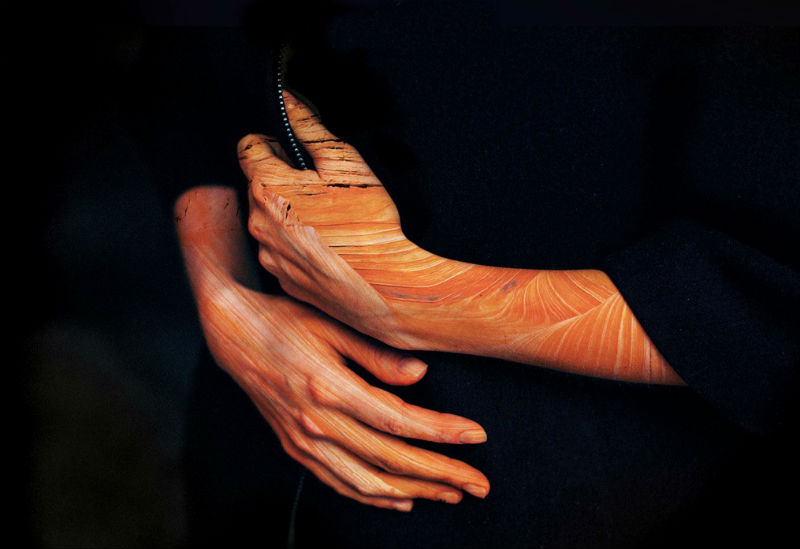
“Theater is poetry that gets up from the page and makes itself human. And when it does that, it talks and shouts, cries and despairs.”
The plot of Yerma -- a story about a woman’s struggles with societal pressures to conceive -- isn’t what makes Lorca’s 1934 tragedy a must-see classic.
What gives it power are the songs, dance, heightened gesture, and visual elements -- the poetry. “Lorca called Yerma ‘a tragic poem in six paintings,’” notes Malcolm Tulip, director of the University of Michigan production running February 20-23 at the Lydia Mendelssohn Theatre.
“Most people assume Yerma is the name of the protagonist, a woman who hasn’t been able to have a child," Tulip says, but the word means “barren” in Spanish and perhaps it isn’t a name at all. Perhaps it “describes this woman’s inner and outer worlds. Yerma here might be a naming of the woman's reluctance or inability to accept the seed of a man who she married out of duty. ... The landscape, like her womb, is uninhabited, possibly uninhabitable."
Great Lakes Ghosts: Roustabout Theatre Troupe Haunts Ypsi With New Zettelmaier Play

Joseph Zettelmaier’s Haunted: The Great Lakes Ghost Project. which closes the Roustabout Theatre Troupe’s season at the Ypsilanti Experimental Space (YES) this month, might never have been written if the founder of another Washtenaw County theater hadn’t encouraged him to write. After studying acting at Shorter University in Georgia, he returned to his family in Michigan and secured an acting apprenticeship at the Purple Rose Theatre Company in Chelsea.
Playwriting? That wasn’t Zettelmaier’s plan.
Apprentices at the Rose often perform on nights when the theater doesn’t have public performances. Sometimes they do original pieces, so Zettelmaier tried his hand at a few pages. “The night we did it, Jeff [Daniels] came up to me and said, ‘Give me 100 pages.’ I had an interest in playwriting, but it was Jeff’s interest in my interest that got me started,” Zettelmaier recalls.


































